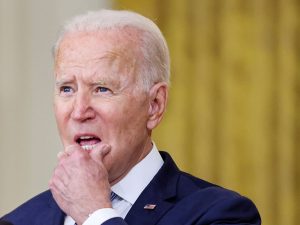
Republicans cry weakness, others see sense in Biden’s China protest response
WASHINGTON – The administration of President Joe Biden has drawn Republican fire for its cautious response to nationwide protests in China against COVID-19 lockdowns, with some lawmakers accusing it of failing to seize a historic moment.
But some analysts say caution is the right approach given the volatile US-China relationship and the risk of playing into a Chinese narrative that accuses “foreign forces” of being behind dissent.
On Monday, the White House said it backed the right of people to peacefully protest in China but stopped short of criticizing Beijing as protesters in multiple Chinese cities demonstrated against heavy COVID-19 measures.
The demonstrations came as the number of COVID cases in China hit record daily highs and large parts of several cities faced new lockdowns.
The Republican response was swift.
Senator Ted Cruz called White House response “pitiful,” adding in a tweet: “At a potentially historic inflection point, Dems shill for the CCP.”
Other Republicans, including Senator Marco Rubio and Representative Chris Smith weighed in on what they labeled a “weak” reaction from Mr. Biden, while Michael McCaul, the Republican lead on the House Foreign Affairs Committee, said in tweet: “As Chinese citizens bravely protest, Joe Biden & the corporate class shrug.”
Mr. McCaul vowed a tougher stance against China from the new Republican-controlled House of Representatives from next year while Rubio and Smith declared: “The United States must be unwavering in our support for the Chinese people as they bravely call for freedom.”
The Republican politicians did not state specifically how they would respond in Mr. Biden’s place.
The administration’s careful language contrasted with Mr. Biden’s earlier expression of solidarity with protesters against the Iranian government, when he told a political rally earlier in November that “we’re gonna free Iran.”
RELATIONS FRAUGHT
China‘s biggest wave of civil disobedience since President Xi Jinping took power a decade ago arrives at a delicate moment in US-China relations.
Following an August visit to Taiwan by US House Speaker Nancy Pelosi, China launched military drills around the island, which it considers Chinese territory, and cut off communications with the US in a number of areas, including military issues and climate change.
Since then, China and the US have worked to steady the relationship. Biden and Xi met in-person on the Indonesian island of Bali earlier in November and the countries have agreed to follow-up discussion, including a planned visit to China by Secretary of State Antony Blinken in early 2023.
A US official involved in U.S.-China policy said the White House believed Xi’s handling of the COVID situation was undermining confidence in his approach to the pandemic, but wanted to avoid being seen to be interfering in domestic politics as they make progress in cooling down the relationship.
Beijing and Washington have dealt with the spread of the coronavirus pandemic in vastly different ways.
China‘s zero-COVID policy has kept its official death toll in the thousands, against more than a million in the United States, but at the cost of confining many people to long spells at home, inflicting extensive disruption and damage to the world’s No.2 economy.
Isaac Stone Fish of Strategy Risks, a firm that helps companies navigate political risk in China, said the White House response was likely conditioned by the fact that the United States has far more at stake in its relations with China than with a country like Iran.
“It also may be a perception of longevity. The Biden administration seems to think that the Chinese Communist Party is more likely to survive its protests than Iran’s government.”
Beyond this, say analysts, the US wants to avoid language that allows China to pin the protests on US interference.
“The White House is wise to refrain from speaking out in defense of the protesters and their demands,” said Scott Kennedy, at the Center for Strategic and International Studies.
“China has long asserted the US government has been behind domestic protests, from Tiananmen in 1989 to Hong Kong in 2020. Saying anything now would give life to those assertions.”
On Monday, Chinese police tightened security at the sites of weekend protests in Shanghai and Beijing and had begun inquiries into some of the protesters, people who were at the Beijing demonstrations told Reuters.
Without explicitly mentioning the protests, China‘s official Xinhua news agency said domestic security chief Chen Wenqing held a meeting of the Central Political and Legal Affairs Commission on Tuesday that vowed to “resolutely crack down on the infiltration and sabotage activities of hostile forces.”
Daniel Russel, who served as the top US diplomat for East Asia in the Obama administration, said the Biden White House would be focused on the next steps by Chinese authorities.
“There will be plenty of time to turn up the rhetorical dial if Beijing follows the violent Tiananmen Square or the Iranian model and starts killing people,” he said. “So getting out of the way and keeping the spotlight on the protesters themselves is a smart move at this point.” – Reuters
